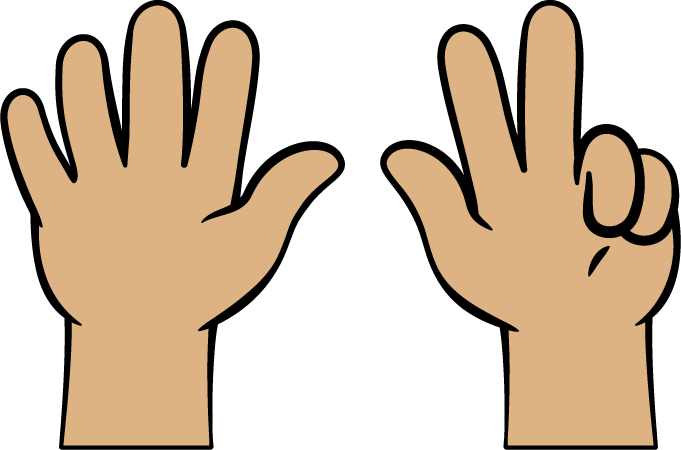Lesson 5
Order Numbers 1-20 (optional)
Warm-up: Choral Count: Count Backward (10 minutes)
Narrative
Launch
- “Let’s start at 10 and count backward to 1.”
- Record as students count.
Activity
- Repeat 3–4 times.
- “Let’s start at 20 and count backward to 1.”
- Record as students count.
- Repeat 2–3 times.
Student Response
For access, consult one of our IM Certified Partners.
Activity Synthesis
- “If we start at 17 and count backward to 1, what number would we say after 16?”
- “If we start at 11 and count backward to 1, what number would we say after 11?”
Activity 1: Order Numbers (10 minutes)
Narrative
The purpose of this activity is for students to put numbers 1–20 in order.
Advances: Speaking, Conversing
Required Materials
Materials to Copy
- Number Cards 1-20
Required Preparation
- Create a set of cards from the blackline master for each group of 4.
Launch
- Groups of 4
- Give each group of students a set of number cards, not in sequence.
Activity
- “Work with your group to put the numbers in order from 1 to 20.”
- 3 minutes: small-group work time
- “Once your group agrees that the numbers are in the correct order, write the numbers in order from 1 to 20.”
- 3 minutes: independent work time
Student Facing
Write the numbers in order.
_________
_________
_________
_________
_________
_________
_________
_________
_________
_________
_________
_________
_________
_________
_________
_________
_________
_________
_________
_________
Student Response
For access, consult one of our IM Certified Partners.
Activity Synthesis
- “How did you decide the order of the numbers?”
- Display numbers 1–12 in order.
- “Clare is putting the numbers in order. What would you say to her to help her find the number that comes next?” (Look for 13 because it comes after 12. Look for the number that has a 3 because the last number has a 2.)
Activity 2: Number Clues (15 minutes)
Narrative
The purpose of this activity is for students to use their knowledge of the number sequence to find the number that matches clues with one more and one less. Numbers 1–20 are displayed around the room. The numbers may be displayed in order, or the sequence of numbers can be mixed up for more of a challenge. The cards with number clues are included as a blackline master; one example is included in the student-facing task statement. Consider developing a signal, such as ringing a bell, so that students know when to move around the classroom. In the activity synthesis, students consider why there can be different clues that match a given number.
Supports accessibility for: Memory, Conceptual Processing
Required Materials
Materials to Copy
- Number Clues
Required Preparation
- Each group of 2 needs one card from the blackline master.
- Display large numbers 1 to 20 around the room. The numbers may be displayed in order, or the sequence of numbers can be mixed up for more of a challenge.
Launch
- Groups of 2
- Display number cards 0–20 around the room, in order or mixed up.
- Give each group of students a card.
- “On your card there are some clues. Each clue says ‘1 more than _____’ or ‘1 less than _____.’”
- “Look at your first clue. Decide with your partner which number matches the clue. Then look around the room and find that number. When I give the signal, walk over to that number.”
Activity
- 2 minutes: partner work time
- “Discuss with the other people at your number. Did you have the same clue? Are you all at the correct number? How do you know?”
- 2 minutes: small-group work time
- Repeat the steps with the rest of the clues.
- During the final round, monitor for a group that notices there are 2 different clues that match the number and discuss why they both match.
Student Response
For access, consult one of our IM Certified Partners.
Activity Synthesis
- Invite previously identified students to share what they noticed during the last round of number clues.
- “‘1 more than 15’ and ‘1 less than 17’ are both clues to 16.”
- “What are two different clues that could match the number 12?”
Activity 3: Centers: Choice Time (20 minutes)
Narrative
- Less, Same, More
- Math Fingers
- Tower Build
- Math Stories
- Which One
Required Materials
Materials to Gather
Required Preparation
- Gather materials from:
- Less, Same, More
- Math Fingers
- Tower Build
- Math Stories
- Which One
Launch
- Groups of 2
- “Today we are going to choose from centers we have already learned.”
- Display the center choices in the student book.
- “Think about what you would like to do first.”
- 30 seconds: quiet think time
Activity
- Invite students to work at the center of their choice.
- 8 minutes: center work time
- “Choose what you would like to do next.”
- 8 minutes: center work time
Student Facing
Choose a center.
Less, Same, More

Math Fingers

Tower Build

Math Stories

Which One

Activity Synthesis
- “In math class, it’s important to be able to explain your thinking. Describe a time when you were able to explain your ideas to other people in your class.”
Lesson Synthesis
Lesson Synthesis
Display number cards 1–20 in order, but with 16 missing.
“I put my numbers in order from 1 to 20, but one of my numbers went missing. Which number is missing and how do you know?” (16 is missing. The missing number comes after 15. The missing number is 1 more than 15. The missing number is 1 less than 17.)
Cool-down: Unit 8, Section A Checkpoint (0 minutes)
Cool-Down
For access, consult one of our IM Certified Partners.
Student Section Summary
Student Facing
In this section, we counted and compared groups of objects.


There are 14 counters and 12 cubes. There are fewer cubes.
We also used what we know about counting to help us figure out 1 more and 1 less.
1, 2, 3, 4, 5, 6, 7, 8
8 is 1 more than 7.
There were 10 people on the bus.
Then 1 person got off the bus.
How many people are on the bus now?
1, 2, 3, 4, 5, 6, 7, 8, 9, 10
9 comes before 10 when we count, so 9 is 1 less than 10.